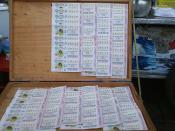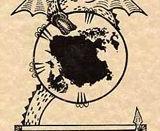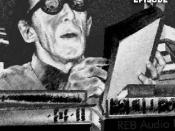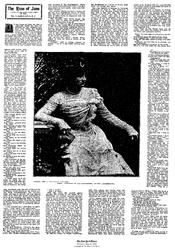Tradition is an important part of everyone~{!/~}s life, however, tradition itself could alter the attitude of human behaviors and guide them to a wrong direction. In the short story ~{!0~}The Lottery,~{!1~} the author, Shirley Jackson, presents the beliefs and the traditions of people from a small village. They follow the tradition although nobody even remembers how the custom came from. They just follow the same routine every year. Even thought some of the villagers intend to end the tradition, nobody dare to stand up and against something that have been done for quite a long time. The story implies, one way or another, that people should have the ability to identify right and wrong, and make their own decision to accept something they believe is true.
The author is intended to give the readers a big surprise with her typical style of writing. The settings of the story in the beginning indicate something positive is about to come.
However, the description of the ending is exactly the opposite of what we expected. The author begins with the establishment of the setting by giving the exact time and day the story takes place. She also describes that the school has just recently over for the summer, letting the readers acknowledge that the time of year is summer. All the descriptions are about the beauty of the day and the brilliance of the nature. This provides the positive outlooks and lets the readers relax into what seem to be a comfortable setting of the story.
In addition, the descriptions of people and their actions are very typical: Children play happily, women gossip, and men talk about framing. Everyone is coming together for what seem to be enjoyable and even celebratory occasion. However, the pleasant descriptions of the setting end up in a brutally violent tradition such as the stoning of Mrs. Hutchinson, who is drafted as the lottery winner. The theme that we learn of at the end leads us to think where the sanity of some human being lies.
The black box uses for the lottery is the central theme and the idea of the story. The people of the village do not even remember all the elements of this lottery. The original black box has been lost, but the new one is at least 80 years old, even older than Old Man Warner, the oldest man in town. It could be assumed that someone in the village had stolen the original one in order to abandon the lottery. At first, the black box symbolizes some type of mystery, but as we read through the end, we realize that it is some kind of evil judgment. Someone~{!/~}s fate lies in that mysterious object. No one in the little town questions about the black box, but accept it as a complicated part of their lives. It appears that tradition has blinded those people in an irrational way, making them unable to think of a reason why this possibly should not be happening, even the manner in which the person is killed. This is simply because as an individual, one feel powerless and unable to stand up against behaviors that have always been accepted. The author is clearly letting us know of some traditions that everyone follows but no one understands.
The stones play a key role in the story, which is implied as human behaviors: hard, cold, and emotionless. A lot of question marks occur in the beginning of the story when the author mentions it again and again. ~{!0~}A pile of stones~{!1~} is specified so many times at the beginning without knowing what they are for. Until the lottery winner is clearly confirmed, we realize that those stones are used to kill the person who is selected as lottery winner. The stones themselves symbolize the evil or cruel side of human nature. When people stone Mrs. Hutchinson to death, somebody gives her son a few stones I order to participate in the killing of his own mother, giving a shocking and disturbing scene of the story. The author is implying that tradition could cover the truth and turn us into cold- blooded and emotionless human beings, just like the stone.
The story also indicates some sort of superstition, mostly from older people. The men in ~{!0~}The Lottery~{!1~} are ~{!0~}speaking of planting and rain, tractor and taxes.~{!1~} What people preformed in the story is supposed to have an effect on the harvest. ~{!0~}Lottery in June, corn be heavy soon~{!1~} used to be a saying in that town. A person~{!/~}s life has to be scarified every single year in order to bring something good for the rest of the people as a return. When Mrs. Adams mentions the Old Man Warnar ~{!0~}that over the north village they~{!/~}re talking of giving up the lottery,~{!1~} he replies ~{!0~}pack of crazy fools~{!1~} and says, ~{!0~}There~{!/~}s always been a lottery~{!1~}, and ~{!0~}Nothing but trouble in that.~{!1~} The people from the village do not even remember how the lottery has begun, but still continue the process for ~{!0~}tradition~{!/~}s sake.~{!1~} In addition, the children are also the vital necessities in the story because they are taught and expected to carry the tradition. It is obvious that how strongly they believe in the so-called ~{!0~}the lottery~{!1~}, and keep up with this for a single purpose, good harvest.
Another thing that the author informs from this story is that when forced with the possibility of death, human nature in all its complexity, comes down to one instinctive urge, that of survival. When Tessie is in no danger, she is gossiping with other ladies and even encourages her husband to go and pick a piece of paper. When she wins the lottery, she pleads for another chance and screams for mercy. She also demands that her daughters take their chance as well, which is the indication of basic instinct of survival. This is a common response of human being when face with death, no matter in what situation.
To conclude, the setting of the story has set up what seem like a wonderful, joy-filled day ended with an unfortunate, tragic death. The story implies one way or another to maintain the ability of making right decisions and to stand up against something that is not true. Tradition is important for a society, but has to be changed or abandoned if harmful to that society.





